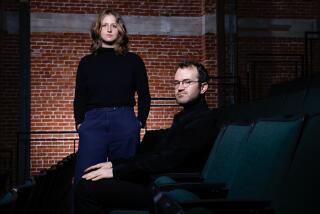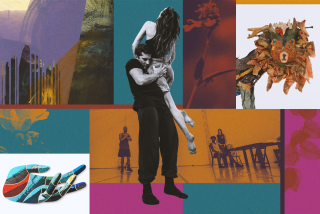Cinematic dance that breaks the rules and moves beyond flirting
Three sisters huddle for survival against trauma. A snowy forest comes to life. A soon-to-marry man can’t shake another woman — literally. All conveyed largely without dialogue, via movement.
“It’s a different way of communicating for both forms,” says Kelly Hargraves, executive and artistic director of Dance Camera West, a festival exhibiting 55 films (mostly shorts) featuring dance. “When we started showing to Hollywood film people, they hated it because it didn’t have rules. It’s not scripted; it doesn’t have a shot list a lot of the time. You can’t be looking at the continuity book. You just sort of flow.”
The festival runs Jan. 9-12 at REDCAT in Downtown Los Angeles, with a Sunday event spilling over to the Downtown Independent (details at the website). One thing you won’t see at Dance Camera West, however, is live dancing. Hargraves has focused on what cinematic tools can bring to the experience.
Watching just a few of the festival’s 17 awards finalists, one is immediately struck by the impact of simply placing dance performances in actual locations, be it in nature or oppressive ramshackle bedrooms, and using judicious close-ups and 360-degree views. These films are imaginative, emotional and beautifully realized for the screen.
The shorts vary wildly. “Some Ways to Get Rid of a Body” seems a surreal metaphor about guilt, responsibility and commitment. “Kopitoto” is lighthearted and weird, invoking hidden forest creatures and the life of a wintry Japanese wood itself. It’s the unholy alliance of Willy Wonka and an ‘80s Residents video (without the menace but with 100 times the technical skill). “Maids” is a single-take, comic look at a domestic worker’s day as she keeps her mind alive through the drudgery, with a hilariously present lead performance.
“Sisters” is a moving examination of the sisterly bond and the sharing of pain. It owes its considerable power not only to its visceral choreography, but its remarkable trio of young dancers. “If I Sound Happy, That’s Your Mistake” puts the hectic fluctuations and exhaustion of anxious self-doubt on display. Los Angeles-based writer-choreographer-performer Matilda Sakamoto takes the viewer on a rocky ride with a too-active mind.
The South Korean “A Town with a Blue Hill” is delightfully freaky, colorful, inventive and creepy. A young couple moves around a neighborhood, observed by others (who may be ghosts), to music akin to Radiohead’s less-percussive experiments. There are historical/cultural references that won’t be clear to most non-Korean viewers. Afterward, one is left breathlessly wondering what choreographer-director Song Joowon’s dreams are like.
“Opening night, we’re honoring two of the most accomplished people in the field,” said Hargraves: Katrina McPherson, who Hargraves says literally “wrote the book” on the subject (“Making Video Dance: A Step-by-Step Guide to Creating Dance for the Screen”); and renowned choreographer Édouard Lock, founder of the Canadian dance company La La La Human Steps. “He made a film a while back [2003] called ‘Amelia’; it’s still like the gold standard. He gave us permission to show part of that, plus a new film” receiving its American debut.
Dance Camera West
Where: REDCAT, 631 W. 2nd St., Los Angeles
When: Jan. 9-12
Tickets: $12 per program; $72 all-access pass
Info: www.dancecamerawest.org/
The Dance Camera West Film Festival is back with its 2020 edition from January 9-12 at REDCAT in Downtown Los Angeles.
More to Read
Only good movies
Get the Indie Focus newsletter, Mark Olsen's weekly guide to the world of cinema.
You may occasionally receive promotional content from the Los Angeles Times.











